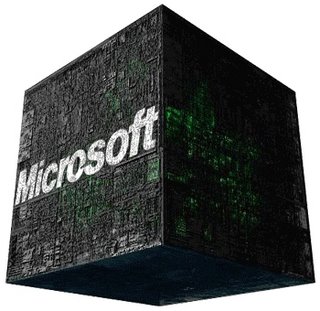Everybody loves to hate Microsoft
 There's no love lost between partisans of Linux and Microsoft. The war between the two has been going on for as long as Linux has been in existence. The war was fanned to a fever pitch with the 2003 SCOX vs. IBM lawsuit, and it's stayed at that level ever since.
There's no love lost between partisans of Linux and Microsoft. The war between the two has been going on for as long as Linux has been in existence. The war was fanned to a fever pitch with the 2003 SCOX vs. IBM lawsuit, and it's stayed at that level ever since.It's totally unsurprising, therefore, that Microsoft's delayed release of Vista would have the anti-Microsoft forces watching gleefully for any signs of stress, internal or external, at Microsoft. Schadenfreude is alive and well and practiced with raucous enthusiasm by many Linux partisans.
Microsoft has no-one to blame for this but itself. Since it's inception 30 years ago, Microsoft has played a brutal game of hardball with competitor and partner alike. The ultimate example of this was Microsoft's treatment of IBM during the initial development of OS/2. IBM and Microsoft were partners until it became obvious that Windows would suite Microsoft's purposes better than OS/2. Microsoft developed and marketed Windows, competing against OS/2. This culminated with the release of Windows 95, where Microsoft finally buried OS/2 once and for all. Windows 95's win over OS/2 was a text-book example of Microsoft FUD versus IBM marketing ineptitude.
Microsoft's business practices go hand-in-hand with their software practices: promise features to keep back the competition, then deliver very little and deliver it late. Such as, for example, Vista, the next greatest version of Windows. Vista is not the first delayed release of Windows. The predecessor to Windows XP, Windows 2000, was paper launched in December 1999. It had been in development for over five years. The other significant problem with Vista, its loss of pre-announced features, is also shared by earlier releases. In fact, the one feature that has forever been added and dropped is an advance file system. Starting in 1994 with Cairo (Windows NT 4), Windows NT was supposed to ship with Object File Store, or OFS. It was supposed to provide a foundation for advanced features, such as search. Sound familiar? It should. It was dusted off and added to Longhorn's features in 2002. It morphed into WinFS, then was dropped again so that Longhorn (now known as Vista) could make an August 2006 delivery.
But even that date has slipped. Vista won't be out now until February 2007. And according to some accounts, over half of Vista needs to be rewritten. That's from leaked internal information and "informed sources." And so the anti-Microsoft forces gleefully report the problems and chant ceaselessly about the coming downfall of Microsoft and the rise, yet again, of Linux. The only problem with reveling in someone else's misfortunes is that what goes around comes around. If we could harness all that energy anti-Microsoft folks want to expend trashing Microsoft, and put it towards really polishing the Linux desktop experience, then maybe, just maybe, Linux really would be a viable alternative to Windows. Instead of the perennial loser.

Comments
Post a Comment
All comments are checked. Comment SPAM will be blocked and deleted.